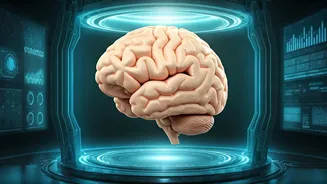Brain's Optimal Years
Recent research suggests that the brain's peak performance doesn't occur as early as previously thought. Scientists have found that the brain's optimal
years are later in life than many anticipate. This insight challenges conventional wisdom, often portraying younger years as synonymous with peak cognitive function. This study indicates that cognitive prowess, including critical thinking, complex problem-solving, and information processing, matures over a longer period than initially believed. Factors like life experiences, education, and lifestyle choices continue to shape brain function, influencing when these peak cognitive abilities emerge. This study provides a fresh perspective on human cognitive development and suggests a potential shift in how we approach lifelong learning and cognitive training. The delayed peak signifies the brain's remarkable plasticity and adaptability throughout the lifespan.
Age vs. Cognitive Skills
The relationship between age and specific cognitive skills is nuanced, as the research highlights. While overall cognitive performance might peak later in life, certain abilities may hit their stride at different ages. The study likely examines various cognitive functions, such as processing speed, memory, and executive function. Processing speed, for instance, might show a gradual decline with age, while the ability to learn and apply accumulated knowledge could continue to strengthen well into the later years. This implies a strategic evolution in the brain's capabilities, where some functions gradually decline while others improve. The findings reveal that the brain isn't a singular entity, but a collection of interconnected systems, each developing at its own pace. The interplay of these diverse cognitive abilities helps individuals adapt to their environment and navigate life's complexities.
Factors Affecting Peak
Several factors contribute to when an individual's brain reaches peak performance, as the study likely illustrates. Genetics play a crucial role, influencing brain structure and cognitive potential. Lifestyle choices, including diet, exercise, and sleep patterns, also significantly impact brain health. For example, regular physical activity boosts blood flow to the brain, which in turn enhances cognitive function. A nutritious diet, rich in essential vitamins and antioxidants, protects brain cells from damage. Moreover, engaging in mentally stimulating activities like learning new skills and socializing can help maintain cognitive acuity. The study's examination of these factors underscores the dynamic interaction between biology, environment, and lifestyle, which collectively shape the timing of peak cognitive function. This holistic view emphasizes individual agency in influencing cognitive health throughout life.
Implications and Applications
The research findings hold various implications for understanding human aging, healthcare, and education. Recognizing the potential for continued cognitive development in later life may encourage adults to actively pursue learning opportunities and mental stimulation. This can potentially reshape how societies view older adults, valuing the experience and wisdom they accumulate. In healthcare, the study could inform the design of cognitive training programs and interventions to support brain health. For example, therapies and exercises tailored to specific cognitive functions might help improve performance at any age. Furthermore, understanding the factors that influence cognitive peak can inform educational practices. Tailoring the content and methods to align with cognitive development will support better learning and ensure that individuals get the most from their education.













